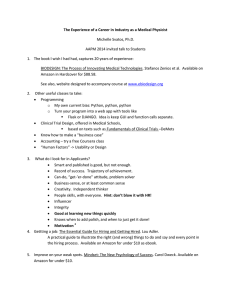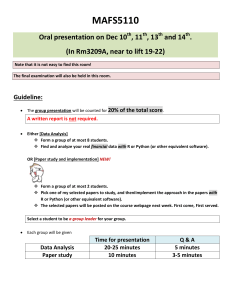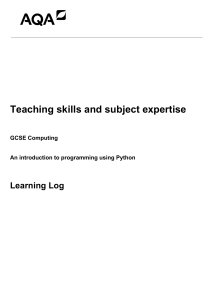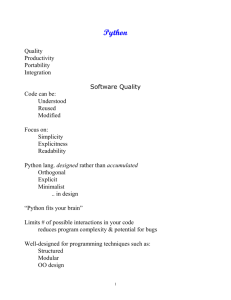Uploaded by
FORKUO MOSES
Python 3 MCQ: Questions & Answers for Jobs & Tests
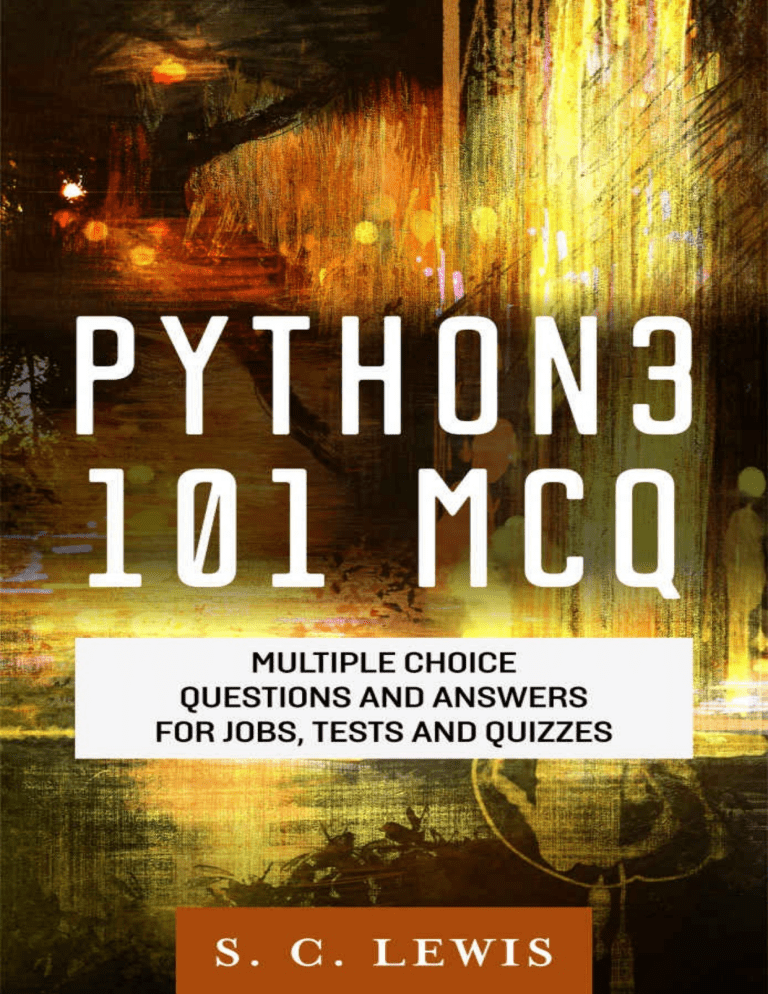
Python3 101 MCQ - Multiple Choice Questions Answers for Jobs, Tests
and Quizzes
By S. C. Lewis
Copyright © 2016, All Rights Reserved
Version: 0.027
Multiple Choice Questions for Python 3 - 101 MCQ’s for Python Jobs,
Tests & Quizzes
If you are learning Python programming on your own (whether you are learning from
Python books, videos or online tutorials and lesson plans) this book is for you. These
questions and answers can be used to test your knowledge of Python3. If you already
know Python, you can still use it to check how many questions you can attempt on your
own without any help. You may want to go through these questions before you appear for
a job interview. If you are a teacher or tutor who is teaching Python, you’ll find these
MCQ useful as a tool to understand how much your students have learned what you have
taught.
All these questions are based on Python 3 and the target level of questions is Beginner
Level - someone who is just starting to learn Python or someone who has recently learnt
Python. Answer Key for these questions is provided at the end.
Recommended Python Books
If you are just trying to learn Python, here are few kindle books that are recommended for
a good understanding of Python programming language.
http://www.amazon.com/dp/B00WJ049VU/
http://www.amazon.com/dp/B00R9JPDN4/
http://www.amazon.com/dp/B00N4IQRD4/
http://www.amazon.com/dp/B018UXJ9RI/
http://www.amazon.com/dp/B00ZOAPQFA/
http://www.amazon.com/dp/B00WOY81TC/
http://www.amazon.com/dp/B01A2DRPOS/
http://www.amazon.com/dp/B00PHTRLO2/
http://www.amazon.com/dp/B0131L3PW4/
http://www.amazon.com/dp/B00YI58B9U/
http://www.amazon.com/dp/B00ADX21Z6/
http://www.amazon.com/dp/B00ZOAQ7S0/
http://www.amazon.com/dp/B00DDZPC9S/
http://www.amazon.com/dp/B00785HI8M/
http://www.amazon.com/dp/B00HZ41PGC/
Python MCQ
1. What will be the output after the following statements?
m = 28
n = 5
print(m // n)
a. 5.0
b. 6
c. 5
d. 4.0
2. What will be the output after the following statements?
m = 90
n = 7
print(m % n)
a. 6
b. 4
c. 6.0
d. 5.0
3. What will be the output after the following statements?
m = 79
n = 64
print(m < n)
a. m < n
b. False
c. True
d. No
4. What will be the output after the following statements?
m = 92
n = 35
print(m > n)
a. True
b. False
c. Yes
d. No
5. What will be the output after the following statements?
m = False
n = True
print(m and n)
a. m and n
b. False
c. True
d. mn
6. What will be the output after the following statements?
m = True
n = False
print(m or n)
a. m or n
b. False
c. True
d. mn
7. What will be the output after the following statements?
m = True
n = False
print(not m)
a. not m
b. False
c. True
d. Not defined
8. What will be the output after the following statements?
m = True
n = False
print('not n')
a. not n
b. False
c. True
d. Not defined
9. What will be the output after the following statements?
m = 7 * 5 + 8
print(m)
a. 91
b. 20
c. 47
d. 43
10. What will be the output after the following statements?
m = 9 * (3 + 12)
print(m)
a. 45
b. 159
c. 95
d. 135
11. What will be the output after the following statements?
m = '40' + '01'
print(m)
a. 4001
b. 01
c. 41
d. 40
12. What will be the output after the following statements?
m = 81 + 34
print(m)
a. 8134
b. 81
c. 115
d. 34
13. What will be the data type of n after the following statements if the user entered the
number 45?
m = input('Enter a number: ')
n = int(m)
a. Float
b. String
c. List
d. Integer
14. What is the data type of m after the following statement?
m = (41, 54, 23, 68)
a. Dictionary
b. Tuple
c. String
d. List
15. What is the data type of m after the following statement?
m = ['July', 'September', 'December']
a. Dictionary
b. Tuple
c. List
d. String
16. What will be the output after the following statements?
m = ['July', 'September', 'December']
n = m[1]
print(n)
a. [‘July’, ‘September’, ‘December’]
b. July
c. September
d. December
17. What will be the output after the following statements?
m = [45, 51, 67]
n = m[2]
print(n)
a. 67
b. 51
c. [45, 51, 67]
d. 45
18. What will be the output after the following statements?
m = [75, 23, 64]
n = m[0] + m[1]
print(n)
a. 75
b. 23
c. 64
d. 98
19. What will be the output after the following statements?
m = ['July', 'September', 'December']
n = m[0] + m[2]
print(n)
a. July
b. JulyDecember
c. JulySeptember
d. SeptemberDecember
20. What will be the output after the following statements?
m = 17
n = 5
o = m * n
print(o)
a. m * n
b. 17
c. 85
d. 5
21. What will be the output after the following statements?
m = [25, 34, 70, 63]
n = m[2] - m[0]
print(n)
a. 25
b. 45
c. 70
d. 34
22. What will be the output after the following statements?
m = [25, 34, 70, 63]
n = str(m[1]) +str(m[2])
print(n)
a. 2534
b. 95
c. 104
d. 3470
23. What will be the data type of m after the following statement?
m = [90, 'A', 115, 'B', 250]
a. List
b. String
c. Dictionary
d. Tuple
24. What will be the data type of m after the following statement?
m = 'World Wide Web'
a. List
b. String
c. Dictionary
d. Tuple
25. What will be the data type of m after the following statement?
m = {'Listen' :'Music', 'Play' : 'Games'}
a. List
b. Set
c. Dictionary
d. Tuple
26. What will be the data type of m after the following statement?
m = {'A', 'F', 'R', 'Y'}
a. List
b. Set
c. Dictionary
d. Tuple
27. What will be the data type of m after the following statement?
m = True
a. List
b. String
c. Dictionary
d. Boolean
28. What will be the data type of m after the following statements?
true = "Honesty is the best policy"
m = true
a. List
b. String
c. Dictionary
d. Boolean
29. What will be the output after the following statements?
m = {'Listen' :'Music', 'Play' : 'Games'}
print(m.keys())
a. dict_keys([‘Listen’, ‘Play’])
b. dict_keys([‘Music’, ‘Games’])
c. dict_keys({‘Listen’ :‘Music’, ‘Play’ : ‘Games’})
d. dict_keys({‘Listen’ : ‘Games’})
30. What will be the output after the following statements?
m = {'Listen' :'Music', 'Play' : 'Games'}
print(m.values())
a. dict_keys([‘Listen’, ‘Play’])
b. dict_values([‘Music’, ‘Games’])
c. dict_values({‘Listen’ :‘Music’, ‘Play’ : ‘Games’})
d. dict_values({‘Listen’ : ‘Games’})
31. What will be the output after the following statements?
m = {'Listen' :'Music', 'Play' : 'Games'}
n = m['Play']
print(n)
a. Listen
b. Music
c. Play
d. Games
32. What will be the output after the following statements?
m = {'Listen' :'Music', 'Play' : 'Games'}
n = list(m.values())
print(n[0])
a. Listen
b. Music
c. Play
d. Games
33. What will be the output after the following statements?
m = {'Listen' :'Music', 'Play' : 'Games'}
n = list(m.items())
print(n)
a. [(‘Play’, ‘Games’), (‘Listen’, ‘Music’)]
b. [(‘Listen’, ‘Music’)]
c. [(‘Play’, ‘Games’)]
d. (‘Play’, ‘Games’), (‘Listen’, ‘Music’)
34. What will be the output after the following statements?
m = 36
if m > 19:
print(100)
a. 36
b. 19
c. 100
d. m
35. What will be the output after the following statements?
m = 50
if m > 50:
print(25)
else:
print(75)
a. 50
b. m
c. 75
d. 25
36. What will be the output after the following statements?
m = 8
if m > 7:
print(50)
elif m == 7:
print(60)
else:
print(70)
a. 50
b. 60
c. 70
d. 8
37. What will be the output after the following statements?
m = 85
n = 17
print(m / n)
a. 5
b. 5.5
c. 6.0
d. 5.0
38. What will be the output after the following statements?
m = 44
n = 23
m = m + n
print(m)
a. 23
b. 44
c. 67
d. m + n
39. What will be the output after the following statements?
m = 20
n = 6
m = m * n
print(m)
a. m * n
b. 20
c. 206
d. 120
40. What will be the output after the following statements?
m = 99
n = 11
m = m - n
print(m)
a. 88
b. 11
c. 99
d. 9911
41. What will be the output after the following statements?
m = 70
n = 10
m = m % n
print(m)
a. 7
b. 70
c. 10
d. 0
42. What will be the output after the following statements?
m = 57
n = 19
o = m == n
print(o)
a. 19
b. True
c. False
d. 57
43. What will be the output after the following statements?
m = 33
if m > 33:
print('A')
elif m == 30:
print('B')
else:
print('C')
a. C
b. B
c. A
d. 33
44. What will be the output after the following statements?
m = 99
if m > 9 and m < 19:
print('AA')
elif m > 19 and m < 39:
print('BB')
elif m > 39 and m < 59:
print('CC')
else:
print('DD')
a. CC
b. DD
c. BB
d. AA
45. What will be the output after the following statements?
m = 200
if m <= 25 or m >= 200:
print('AA')
elif m <= 45 or m >= 150:
print('BB')
elif m <= 65 or m >= 100:
print('CC')
else:
print('DD')
a. CC
b. DD
c. BB
d. AA
46. What will be the output after the following statements?
m = 6
while m < 11:
print(m, end='')
m = m + 1
a. 6789
b. 5678910
c. 678910
d. 56789
47. What will be the output after the following statements?
m = 2
while m < 5:
print(m, end='')
m += 2
a. 24
b. 246
c. 2468
d. 248
48. What will be the output after the following statements?
m = 1
n = 5
while n + m < 8:
m += 1
print(m, end='')
a. 123
b. 23
c. 234
d. 2345
49. What will be the output after the following statements?
m, n = 2, 5
while n < 10:
print(n, end='')
m, n = n, m + n
a. 25
b. 58
c. 579
d. 57
50. What will be the output after the following statements?
m = 'ABC'
for i in m:
print(i, end=' ')
a. A
b. ABC
c. A B C
d. I
51. What will be the output after the following statements?
for m in range(7):
print(m, end='')
a. 0123456
b. 01234567
c. 123456
d. 1234567
52. What will be the output after the following statements?
for m in range(6,9):
print(m, end='')
a. 67
b. 678
c. 6789
d. 5678
53. What will be the output after the following statements?
for m in range(2,9,3):
print(m, end='')
a. 293
b. 369
c. 239
d. 258
54. What will be the output after the following statements?
m = ('m', 'n', 'o', 'p')
for n in m:
print(n, end=' ')
a. n
b. mnop
c. m n o p
d. (‘m’, ‘n’, ‘o’, ‘p’)
55. What will be the output after the following statements?
m = {'m', 'n', 'o', 'p'}
if 'n' in m:
print('n', end=' ')
a. n
b. mnop
c. m n o p
d. {‘m’, ‘n’, ‘o’, ‘p’}
56. What will be the output after the following statements?
m = {45 : 75, 55 : 85}
for i in m:
print(i, end=' ')
a. 45 : 75
b. 45 55
c. 55 : 85
d. 75 85
57. What will be the output after the following statements?
m = {45 : 75, 55 : 85}
for n, o in m.items():
print(n, o, end=' ')
a. 45 : 75, 55 : 85
b. {45 : 75, 55 : 85}
c. 45 55 75 85
d. 45 75 55 85
58. What will be the output after the following statements?
for m in range(6,9):
print(m, end='')
if m == 8:
break
a. 67
b. 679
c. 678
d. 6789
59. What will be the output after the following statements?
for m in range(6,9):
if m == 8:
continue
print(m, end='')
a. 67
b. 679
c. 678
d. 6789
60. What will be the output after the following statements?
m = [15, 65, 105]
n = 5 in m
print(n)
a. 15
b. [15, 65, 105]
c. True
d. False
61. What will be the output after the following statements?
m = 18
def nop() :
print(m)
nop()
a. m
b. nop
c. 18
d. mnop
62. What will be the output after the following statements?
def abc(m, n) :
print(m - n)
abc(14, 5)
a. (14, 5)
b. 145
c. m - n
d. 9
63. What will be the output after the following statements?
def abc(m=15, n=10, o=5) :
print(m * n + o)
abc()
a. 150
b. 155
c. 0
d. 225
64. What will be the output after the following statements?
def abc(m, n) :
return m * n
print(abc(7, 3))
a. 21
b. 7, 3
c. (7, 3)
d. m * n
65. What will be the output after the following statements?
def p(m, n) :
return m / n
o = p(50, 5)
print(o)
a. 5
b. 50 / 5
c. 10.0
d. 10
66. What will be the output after the following statements?
m = {'Listen' :'Music', 'Play' : 'Games'}
n = m['Music']
print(n)
a. Music
b. KeyError
c. m[‘Music’]
d. Listen
67. What will be the output after the following statements?
m = lambda n: n**3
print(m(6))
a. 6
b. 18
c. 36
d. 216
68. What does the following statement do?
import os
a. Displays the operating system name and version
b. Imports the os module
c. Imports the os function
d. Imports the directory named os
69. What will be the output after the following statements?
m = 'Play'
n = 'Games'
print(n + m)
a. Play
b. Games
c. PlayGames
d. GamesPlay
70. What will be the output after the following statements?
m = 'Play'
n = m * 2
print(n)
a. PlayPlay
b. Play
c. Play2
d. Play*2
71. What will be the output after the following statements?
m = 'Play Games'
n = m[6]
print(n)
a. m[6]
b. Play Games
c. a
d. G
72. What will be the output after the following statements?
m = 'Play Games'
n = m[7:9]
print(n)
a. ame
b. Play Games
c. Game
d. me
73. What will be the output after the following statements?
m = 'Play Games'
n = m[:]
print(n)
a. ame
b. Play Games
c. Play
d. Games
74. What does the following statement do?
m = open('games.txt', 'r')
a. Opens an existing text file named games.txt to read
b. Opens an existing text file named games.txt to write
c. Opens a new file named games.txt to read
d. Opens an existing text file named games.txt to append
75. What does the following statement do?
m = open('games.txt', 'w')
a. Opens a new file named games.txt to write
b. Opens or creates a text file named games.txt to write
c. Opens or creates a text file named games.txt to read
d. Opens or creates a text file named games.txt to append
76. What does the following statement do?
x = open('games.txt', 'a')
a. Opens a new file named games.txt to append
b. Opens or creates a text file named games.txt to write
c. Opens or creates a text file named games.txt to read
d. Opens or creates a text file named games.txt to append
77. Who is the creator of Python?
a. Albert Einstein
b. Monty Python
c. Leonardo da Vinci
d. Guido Van Rossum
78. What will be the output after the following statements?
m = False
n = True
o = False
print(m and n and o)
a. m and n
b. True
c. False
d. Error
79. In the order of precedence, which of the operation will be completed first in the
following statement?
7 * 4 + 9 - 2 / 3
a. Addition
b. Subtraction
c. Multiplication
d. Division
80. In the order of precedence, which of the operation will be completed last in the
following statement?
7 * 4 + 9 - 2 / 3
a. Addition
b. Subtraction
c. Multiplication
d. Division
81. What will be the output after the following statements?
m = 36 / 4 % 2 * 5**3
print(m)
a. 125.0
b. 0
c. 36
d. 14.0
82. What will be the output after the following statements?
m = 8 / 4 * 10 + 6 **2
print(m)
a. 32
b. 45.0
c. 56.0
d. 0.0
83. What will be the output after the following statements?
m = [4, 8]
print(m * 3)
a. [4, 8]
b. [4, 8, 4, 8]
c. [4, 8] * 3
d. [4, 8, 4, 8, 4, 8]
84. What will be the output after the following statements?
m = 67
n = m
m = 72
print(m, n)
a. 67 72
b. 72 67
c. 7267
d. 72 72
85. What will be the output after the following statements?
m = 20 *
n = 20 *
o = 20.0
print(m,
10 // 30
10.0 // 40
* 10 / 50
n, o)
a. 6.5 5.0 4.5
b. 6.0 5.0 4
c. 5 6.0 4.0
d. 6 5.0 4.0
86. What will be the output after the following statements?
m = 2
for n in range(3, 15, 5):
n += m + 2
print(n)
a. 14
b. 16
c. 17
d. 19
87. What will be the output after the following statements?
m = False
print(m or not m)
a. a
b. False
c. not a
d. True
88. What will be the output after the following statements?
m = min(50, 25, 65, 0, 99)
print(m)
a. 0
b. 99
c. 25
d. (50, 25, 65, 0, 99)
89. What will be the output after the following statements?
m = [50, 25, 65, 0, 99]
n = max(m)
print(n)
a. 0
b. 99
c. 25
d. (50, 25, 65, 0, 99)
90. How many times will “Music” be printed after the following statements?
for i in range(3, 7):
print('Music')
a. 3
b. 4
c. 5
d. 6
91. What will be the output after the following statements?
m = 39
n = 61
o = (m + n) // 2
print(o)
a. 40.0
b. 50.0
c. 50
d. 55
92. What will be the output after the following statements?
m = 10*10**1
print(m)
a. 10
b. 1
c. 1000
d. 100
93. What will be the output after the following statements?
m = []
for n in range(6):
m.append(n*3)
print(m)
a. [3, 6, 9, 12, 15]
b. [0, 3, 6, 9, 12]
c. [0, 3, 6, 9, 12, 15]
d. []
94. What will be the output after the following statements?
m = [n*4 for n in range(3)]
print(m)
a. [0, 0, 0]
b. [0, 4, 8]
c. [0, 4, 8, 12]
d. [0, 4, 8, 12, 16]
95. What will be the output after the following statements?
m = [-5, -2, 0, 3, 4]
print([n*2 for n in m])
a. [-10, -4, 0, 6, 8]
b. [10, 4, 0, 6, 8]
c. [-10, -4, 0, 6]
d. [-10, -4, 0]
96. What will be the output after the following statements?
m = [5, 10, 35]
del m[:]
print(m)
a. [5, 10, 35]
b. []
c. [5, 35]
d. 5, 10, 35
97. What will be the output after the following statements?
m = 'A'
n = 'B'
o = 'C'
p = [m, n, o]
print(p)
a. [‘C’, ‘B’, ‘A’]
b. ‘C’, ‘A’, ‘B’
c. [‘C’, ‘A’, ‘B’]
d. [‘A’, ‘B’, ‘C’]
98. What will be the output after the following statements?
m = list(range(7,10))
print(m)
a. [7, 8, 9, 10]
b. list([7, 8, 9])
c. [7, 8, 9]
d. 789
99. What will be the output after the following statements?
m = [10, 25, 35]
n = sum(m)
print(n)
a. 35
b. 25
c. 10
d. 70
100. What will be the output after the following statements?
m = ['Games', 'in', 'Python']
n = 'Play' + m[0] + m[1] + m[2]
print(n)
a. PlayGamesinPython
b. Play Games in Python
c. Games in Python
d. GamesinPython
101. What will be the output after the following statements?
m = ['Play']
n = ['Games', 'in', 'Python']
o = m + n
print(o)
a. [‘Games’, ‘in’, ‘Python’, ‘Play’]
b. [‘Play Games’, ‘in’, ‘Python’]
c. [‘Play’, ‘Games’, ‘in’, ‘Python’]
d. [‘PlayGames’, ‘in’, ‘Python’]
Answer Key
1. c
2. a
3. b
4. a
5. b
6. c
7. b
8. a
9. d
10. d
11. a
12. c
13. d
14. b
15. c
16. c
17. a
18. d
19. b
20. c
21. b
22. d
23. a
24. b
25. c
26. b
27. d
28. b
29. a
30. b
31. d
32. b
33. a
34. c
35. c
36. a
37. d
38. c
39. d
40. a
41. d
42. c
43. a
44. b
45. d
46. c
47. a
48. b
49. d
50. c
51. a
52. b
53. d
54. c
55. a
56. b
57. d
58. c
59. a
60. d
61. c
62. d
63. b
64. a
65. c
66. b
67. d
68. b
69. d
70. a
71. c
72. d
73. b
74. a
75. b
76. d
77. d
78. c
79. c
80. b
81. a
82. c
83. d
84. b
85. d
86. c
87. d
88. a
89. b
90. b
91. c
92. d
93. c
94. b
95. a
96. b
97. d
98. c
99. d
100. a
101. c
FAQ
Q 1. These questions are based on which version of Python?
Ans: All the MCQ for this book are based on Python 3.
Q 2. The questions have been tested on which platforms?
Ans: These questions have been tested with Python 3.4.0 on Linux and Windows
operating systems. You might want to download/update the newest Python version from
www.Python.org for your own system before attempting these questions.
Q 3. I have just started to learn Python. Will I be able to answer these questions?
Ans: The questions for this book are written for beginners level and are intended for
someone who has recently learnt Python. Someone who has just started to learn Python is
likely to find these questions useful too.
Q 4. When I run the statements given in the question, I am not able to get any of the 4
options as my output?
Ans: It is recommended that you try to run the statements for which some output is
expected by saving them as a program in the IDLE File Editor only (unless noted
otherwise) and if it not works as expected then only try it in IDLE shell (one statement at a
time). In some rare cases, it might be because of the version of Python you are using and
your operating system as some questions might give platform specific output.
Q 5. When I run the statements given in the question, the output is not in the same order or
exactly same as the given answer?
Ans: This is because some statements and functions give a random output or an unsorted
order of items. In such cases, you may select the answer which is most likely to be the
possible answer based on your understanding of Python.
Q 6. What is the recommended approach to solve these questions?
Ans: The best approach to solve these questions is to take a pen(or pencil) & paper and try
attempting these questions one by one.
1. If you do not know the answer to a particular question (may be you have not learnt the
topic yet), you may leave the answer for that question blank, skip that question for the
moment and come back to attempt it after you have learnt that topic.
2. If you attempted a question but your answer was wrong, go through your Python notes
(or books) again and then re-attempt that question later when you have thoroughly grasped
that concept.
3. If you get all the answers right in your first attempt, Congratulations! you are doing
something right. You can still come back to these questions after a while for revision and
to keep those topics and the related concepts in your memory refreshed.
Q 7. Does the answer key contains the explanations to these questions too?
Ans: The answer key contains only the answers and does not contain the explanation to
the answers. This is because most of the answers are self-explantory or very simple to
understand if you have understood the basic concepts well. If you still face some
difficulty, try thinking for a while and you’ll know why. Or else, you might Google that
statement or expression and you are likely to find your explanation easily but you might
not need to go that far. If you still face any problems, feel free to ask me.
Thank You
Thanks for buying this book. I hope you enjoyed this book, the first book in the ‘Python 3
Beginners Guide’ series. If you’d like to be notified when I release the next book in this
series and others, do let me know at sclewis2016@outlook.com This e-book is lendingenabled. You can tell others what you liked about this book by writing a review.
If you find an errors or have any suggestions, feel free to let me know at
sclewis2016@outlook.com
More Books by the Author
If you liked this book, you might want to check the other books by the author too.
1.) Python 3 MCQ - Multiple Choice Questions n Answers for Tests, Quizzes - Python
Students & Teachers
2.) Python3 101 MCQ - Multiple Choice Questions Answers for Jobs, Tests and Quizzes
